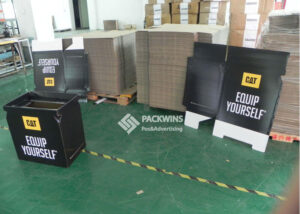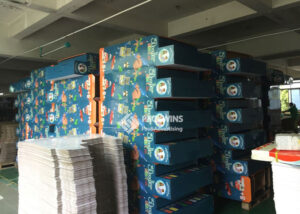Cardboard displays are an excellent way to capture attention in retail spaces, offering an eco-friendly and customizable alternative to traditional displays. To ensure that your display stands out and drives sales, it’s crucial to follow design principles that not only grab attention but also communicate your brand message effectively. Here are five key design principles to consider when creating eye-catching cardboard displays:
Maximize Visual Impact with Bold Colors and Graphics
Colors are one of the most powerful tools in design. Bright, bold colors can attract customers’ attention and evoke specific emotions that align with your brand. Whether you’re using colors that match your product packaging or creating a vibrant display to draw attention to new arrivals, make sure the colors are eye-catching but still complementary to your overall brand image.
Graphic elements, such as large logos, product images, or themed visuals, can also enhance the visual appeal of your display. Just ensure that the graphics are high-quality and visually aligned with the season or promotion.

Keep It Simple and Clear
While flashy colors and graphics are important, clarity is just as critical. The best displays are those that convey the message at a glance. Keep text minimal, choosing only essential information that is easy to read from a distance. Large fonts, clear product names, and concise promotional messages help ensure that customers can quickly understand what the display is about.
Tip: Use bullet points or large headings for key messages, and avoid overcrowding the display with excessive details. Too much information can overwhelm customers and dilute the impact.
Incorporate 3D Elements to Create Depth
One of the unique advantages of cardboard displays is their ability to create three-dimensional shapes that draw people’s attention. Whether it’s a simple stand or a more intricate pop-up display, incorporating 3D elements can add depth and make the display feel more interactive.
For example, you could create a display that mimics the shape of the product or a life-sized version of your brand mascot. 3D design engages shoppers and encourages them to interact with the display, ultimately increasing engagement and conversions. For more display types we can refer to TheCorrPro.
Ensure Brand Consistency
Every display should be an extension of your brand. Consistency in your design helps to reinforce brand recognition and trust. Whether you are using colors, fonts, logos, or the overall style of the display, ensure that it reflects your brand’s identity.
For instance, if your brand is known for its clean and minimalist aesthetic, your display should reflect that with simple designs and neutral tones. If your brand is bold and energetic, use vibrant colors, dynamic graphics, and larger-than-life visuals.

Optimize Functionality and Durability
While design aesthetics are crucial, the functionality of the cardboard display cannot be overlooked. The display should not only look great but also support your products effectively. Ensure that the structure is sturdy enough to hold the weight of the items without risk of collapsing. The design should also be easy to assemble and place in the retail space without the need for specialized tools.
Tip: Consider adding features such as adjustable shelves, or a slotted design that allows for easy stacking. If your display is designed to be portable, make sure it can be easily folded flat for shipping and storage. This can also be seen from Cardboard Display Company.
Conclusion By following these five design principles—bold visuals, simplicity, 3D elements, brand consistency, and functionality—you can create cardboard displays that captivate consumers, enhance your brand’s presence, and drive sales. A well-designed display not only grabs attention but also invites interaction, creating a memorable experience for your customers.
Would you like further examples or tips on creating the perfect cardboard display? Let me know!



